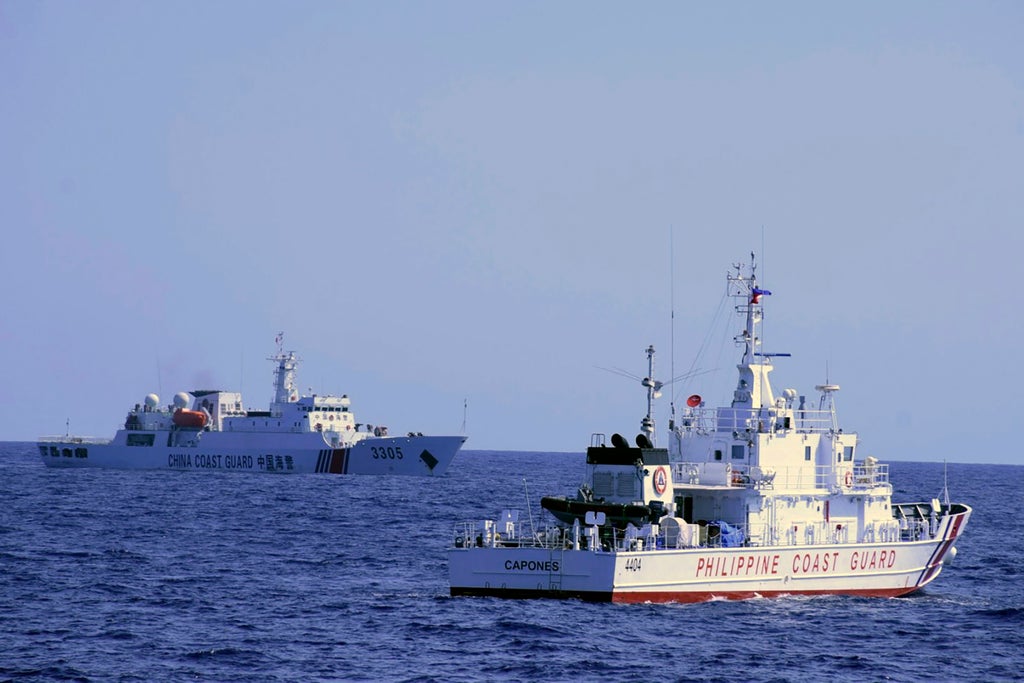
Chinese coast guard ships maneuvered dangerously close to Philippine coast guard ships at least four times near a disputed shoal over the past year, in moves that increased the risk of collision and violated international safety regulations, the Philippine coast guard said Sunday.
It was not immediately clear if the Philippine government has formally protested the aggressive actions by the Chinese coast guard ships, but Manila’s coast guard said the incidents would not deter it from deploying patrol ships at the Scarborough Shoal and in other areas within the country’s internationally recognized exclusive economic zone.
The incidents were reported to the Department of Foreign Affairs in Manila and an inter-agency body on the disputed South China Sea “to address this issue through rules-based and peaceful approaches,” Philippine coast guard chief Admiral Artemio Abu said in a statement.
Earlier this month, a Chinese coast guard ship maneuvered just 21 yards (63 feet) from a Philippine coast guard patrol vessel and restricted its maneuvering space in the vicinity of Scarborough, the Philippine coast guard said, adding that the Chinese ship’s action was “a clear violation” of a 1972 international safety regulation that aims to prevent sea collisions.
In June last year, two Chinese coast guard ships on two successive days moved dangerously close to two Philippine coast guard ships, which were participating in a maritime exercise off Scarborough. A month before, a Chinese coast guard ship moved close to a Philippine Bureau of Fisheries vessel manned by coast guard personnel also near Scarborough, according to the coast guard.
There was no immediate comment from the Chinese Embassy in Manila.
China seized Scarborough, a rich fishing area about 200 kilometers (120 miles) off the northwestern coast of the Philippines and 600 kilometers (370 miles) southeast of China, after a tense sea standoff in 2012. Chinese coast guards ships then surrounded the shoal and restricted the access of Filipino fishermen to it.
That prompted the Philippines to bring its disputes with China to international arbitration the following year. In 2016, a U.N.-backed arbitration tribunal invalidated China’s claims to virtually the entire South China Sea and said China has violated the rights of Filipinos to fish at Scarborough.
China dismissed the ruling as a sham and continues to defy it but allowed Filipino fishermen to return to the shoal under Philippine President Rodrigo Duterte, who nurtured closer ties with Beijing after taking office in 2016. Despite cozier relations, however, sporadic territorial spats have persisted between the Asian countries.
Vietnam, Malaysia, Taiwan and Brunei also lay claims to the busy waterway through which an estimated $5 trillion in global trade passes each year.
The U.S. military has accused China of bullying smaller claimant countries like the Philippines and has deployed Navy ships and aircraft to promote freedom of navigation and overflight in the disputed region. China has warned Washington to stay away and accused it of meddling in what it says is a purely Asian dispute.
“We are fully aware of dangerous situations at sea, but these will not stop our deployment of assets and personnel” to serve Filipino fishermen at sea, Abu said. “As long as they feel safe seeing us during their fishing operations, we know that we are doing our job well.”







